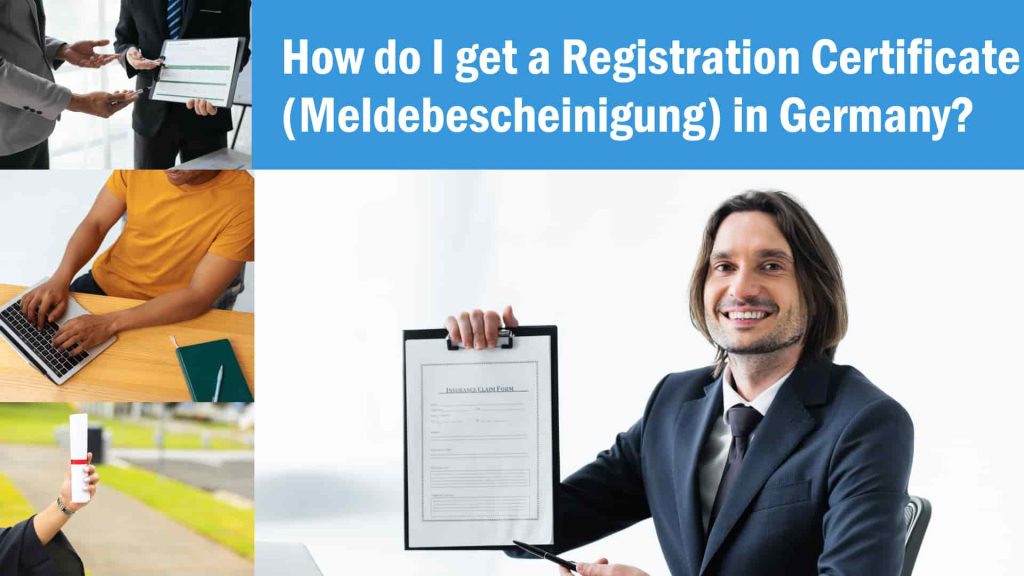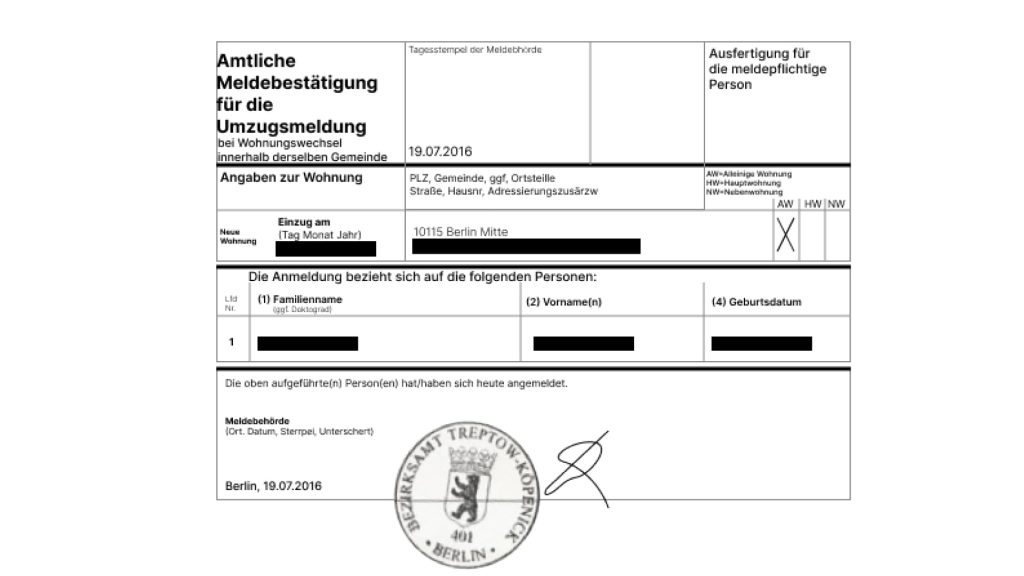
Introduction to Registration Certificate in Germany
Have you just moved to Germany? One of the first things you will need to do before unpacking is REGISTER your residence. This may seem simple, but it comes with an official document – the registration certificate, known in German as Meldebescheinigung or Anmeldebestätigung – that’s crucial for your everyday life in Germany.
This article will cover everything you need to know about the registration certificate in Germany. Let’s get started!
What is a Registration Certificate?

A Registration Certificate in Germany, also known as a “Meldebescheinigung,” is a document that proves your registered address in Germany, whether you are an expat or a German citizen.
When you move to a new place in Germany, you must register your address with the local registration office, known as the “Bürgeramt” or “Einwohnermeldeamt.” After you register, they will issue you this certificate.
It usually includes your entire name, registered address, date of birth, and sometimes your nationality. The document is straightforward, with official seals and signatures proving its legitimacy.
Why is a Registration Certificate so important in Germany?
The Registration Certificate, or “Meldebescheinigung,” is extremely important in Germany for both citizens and residents for:
- registering the place of residence
- administrative activities such as opening a bank account, activating the internet, getting a mobile phone, etc…
- signing up for health insurance
- enrolling children and students in schools and universities
- vehicle registration
- employment and taxation
- different bureaucratic and legal purposes like residency status
- registering to vote in local and national elections
In short, the Registration Certificate is a fundamental document in Germany, needed for completing legal responsibilities and accessing essential services and rights.
Registration Certificate aka Meldebescheinigung and Anmeldebestätigung
In Germany, “Meldebescheinigung” and “Anmeldebestätigung” are two important terms used to register one’s home.
What is Meldebescheinigung?
This is a Registration Certificate, which proves your registered address in Germany. It acts as a permanent record and is typically requested after you have registered your address (a process called “Anmeldung”) and require official documents to verify your residency for a variety of reasons, such as a visa, marriage, or other administrative procedures.
The Meldebescheinigung includes your name, registration address, date of birth, nationality, and marital status. The local residents’ registration office issues it upon request for a small cost.
What is Anmeldebestätigung?
The Anmeldebestätigung is a temporary confirmation document issued following initial registration with the Einwohnermeldeamt. It usually contains your name, address, date of birth, and arrival date. However, unlike the Meldebescheinigung, the Anmeldebestätigung has a validity duration of only 14 days. During this period, you must utilize this document to apply for your formal Meldebescheinigung.
What is the difference between Meldebescheinigung and Anmeldebestätigung?
The fundamental difference between a Meldebescheinigung and an Anmeldebestätigung is that the Meldebescheinigung is a permanent registration certificate, while the Anmeldebestätigung is a copy of your registration certificate.
Here is a table that summarizes the differences between Meldebescheinigung and Anmeldebestätigung:

Remember, the Anmeldebestätigung is only useful for a short period of time. You will need it to apply for a Meldebescheinigung.
How to get a registration certificate in Germany?

To fully integrate and access key services in Germany, you will need to register your address. This process entails obtaining Anmeldebestätigung (Copy of Registration Certificate) to get Meldebescheinigung (Registration Certificate).
How to get an Anmeldebestätigung?
To get an Anmeldebestätigung, follow the below steps:
Anmeldung Process:
When you relocate to a new residence in Germany, you must register your address at the local residents’ registration office, known as the “Bürgeramt” or “Einwohnermeldeamt,” within a certain timeframe (typically within two weeks of moving in).
Required Documents:
Bring your passport or ID, rental contract, or proof of residence, and, if applicable, a completed registration form (which can usually be retrieved from the city’s official website).
Visit the Office:

You may need to make an appointment, which can usually be done online or over the phone, depending on the city.
Receive Anmeldebestätigung:
After successfully registering, the office will send you your Anmeldebestätigung, which serves as immediate proof of registration and a temporary registration certificate.
How to get a Meldebescheinigung?
To get your Meldebescheinigung, follow the below steps:
Using the Anmeldebestätigung:
Within the 14-day validity period of your Anmeldebestätigung, apply for the Meldebescheinigung. You may be able to accomplish this during your initial registration appointment or as a separate request.
Possible Additional Documents:
While the Anmeldebestätigung and proof of identity are normally sufficient, some offices may want additional documents, including your visa or residency permit (if applicable).
Registration Certificate Collection:

Once processed, you will receive the Meldebescheinigung via mail or collect it in person.
Note: In some cases, you may be eligible to apply for the Meldebescheinigung without obtaining the Anmeldebestätigung beforehand. Check with your local Einwohnermeldeamt about their specific procedures.
Also Read: All about German Personal Identification Numbers
Frequently Asked Questions
What is a deregistration certificate in Germany?
In Germany, a deregistration certificate (“Abmeldebestätigung”) is an official document that confirms that an individual has formally deregistered their residence with the local authorities, usually when moving out of Germany or to a different municipality within Germany. You receive it by alerting the local registration office (Bürgeramt or Einwohnermeldeamt) of your departure and submitting the appropriate information, such as your departure date and future address if known.
How do I get a certificate of residence in Germany?
A certificate of residence in Germany, also known as a “Meldebescheinigung,” can be obtained by first registering your address with the local registration office after moving to a new location. After registering, you can obtain the Meldebescheinigung at the same office by presenting a valid ID, which potentially costs a small amount. Some municipalities may offer online applications for this credential.
What is Registration Certificate Part 1 and 2 in Germany?
In Germany, the Registration Certificate Part 1 and 2 refer to vehicle registration documents, not personal residence registration. Part 1 (“Fahrzeugschein”) is a vehicle registration certificate carried in the vehicle, while Part 2 (“Fahrzeugbrief”) is a more detailed document kept securely by the vehicle owner, used for ownership transfer and other significant transactions.
How long can I stay without a registration certificate in Germany?
In Germany, individuals must register their residence within 14 days of relocating to a new address. Failing to register within this timeframe can result in fines and administrative issues.
How do I get registered as an expat in Germany?
The process for obtaining registration certificates in Germany applies equally to expats and German citizens. You’ll need to visit the Einwohnermeldeamt with the required documents, which typically include:
- Valid passport or ID card
- Completed registration form
- Confirmation of residency from your landlord (Wohnungsgeberbestätigung)
After processing, you’ll receive an Anmeldebestätigung as proof of registration.
Conclusion

Acquiring a registration certificate (Meldebescheinigung or Anmeldebestätigung) is an essential step for anyone relocating to or living in Germany, whether an expat or a citizen. While intimidating at first, these systems are intended to ensure that all residents are accounted for and have access to the services and rights to which they are entitled.
Acquiring a registration certificate (Meldebescheinigung or Anmeldebestätigung), is an essential step for anyone relocating to or living in Germany, whether an expat or a citizen. These systems, while intimidating at first, are intended to ensure that all residents are accounted for and have access to the services and rights to which they are entitled. The registration certificate not only serves as proof of residence but is a must-have for access to a variety of vital services and to meet legal duties within the country.




